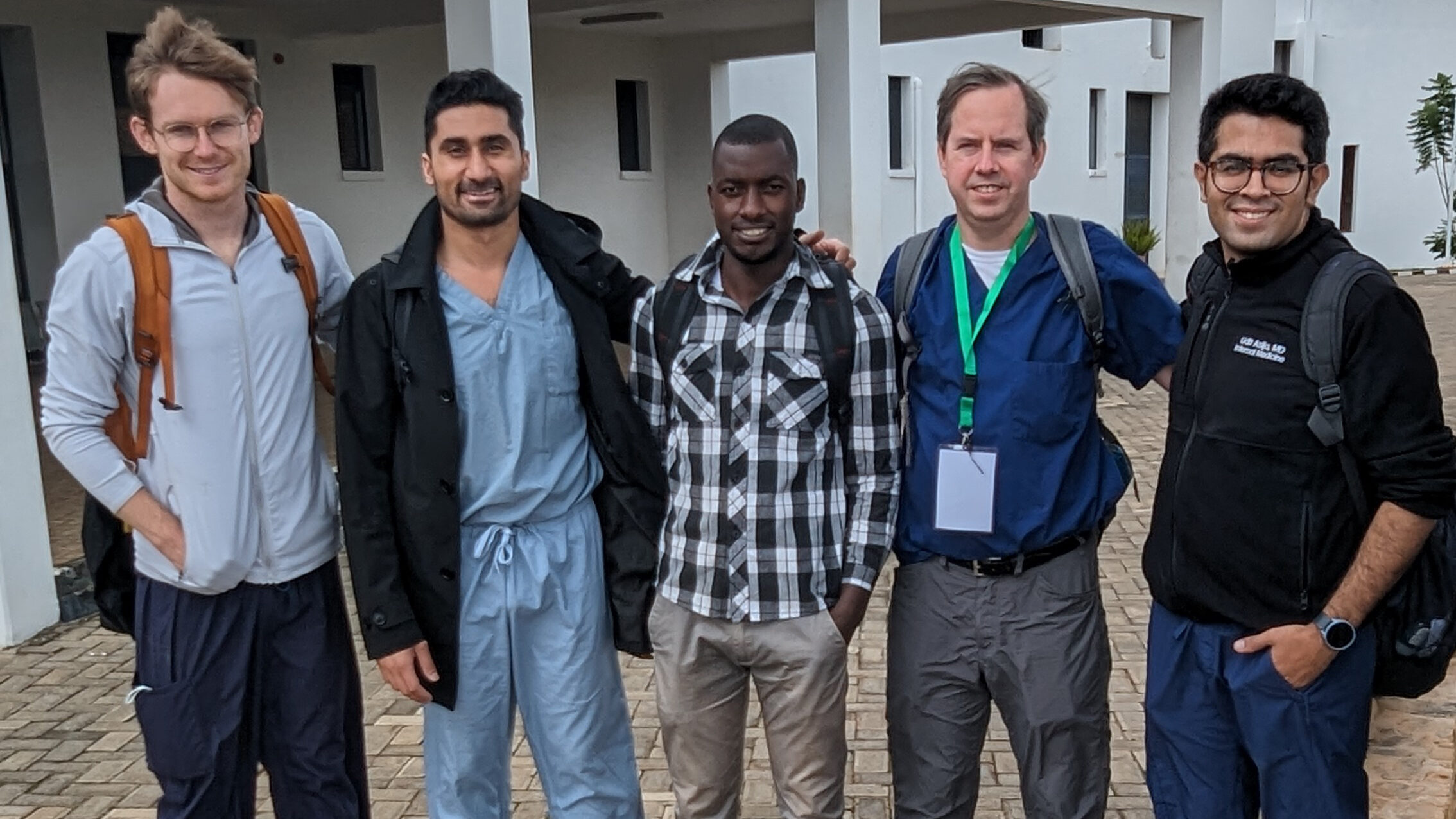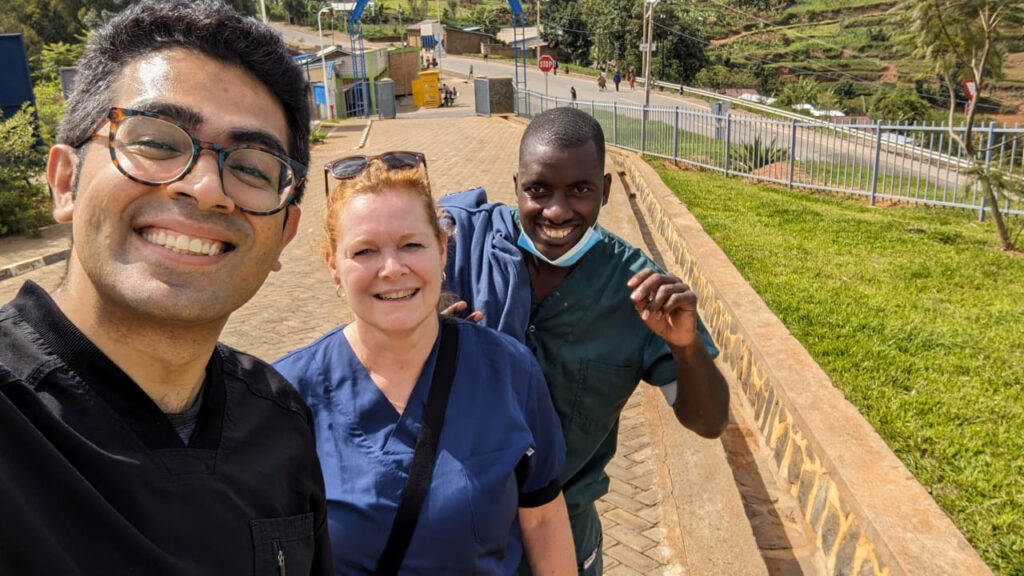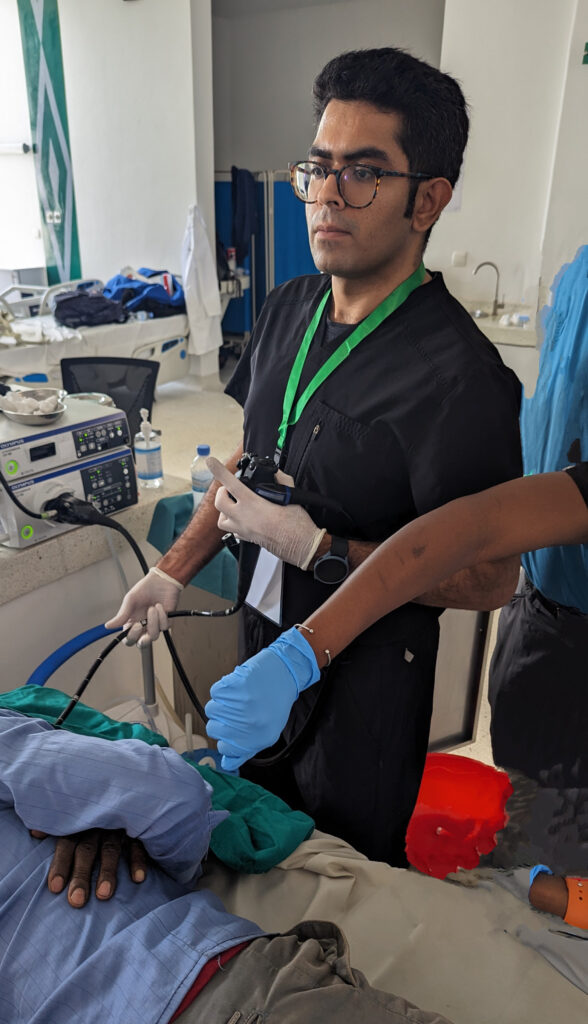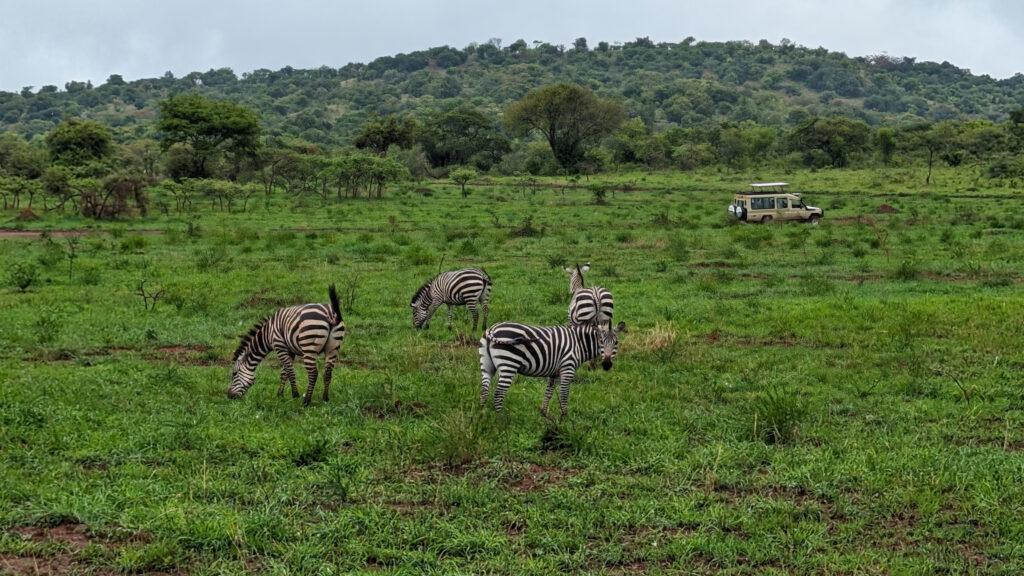Resident physician confirms his calling during service trip to Rwanda

The GI Rising trip took Wright Center Internal Medicine Resident Dr. Udit Asija, far right, to the Munini District Hospital in Rwanda, where he worked with, from left, Peter Rentzepis, a medical student at Harvard University Medical School; Osman Ali, a Gastroenterology and Advanced Endoscopy Fellow at the University of Maryland Medical Center; Emmanuel Nkusi, clinical officer anesthetist from Rwanda; and Dr. Erik C. Von Rosenvinge, gastroenterologist and faculty physician at the University of Maryland Medical Center.
Will pursue career in hepatology after completing Internal Medicine residency
Nestled between panoramic photos of Rwanda’s lush green hills and videos of zebras crossing in front of a safari vehicle on Udit Asija’s camera roll are extreme close-ups taken inside strangers’ internal organs.
The photos and videos are from what Dr. Asija calls a career-defining trip to the East African country as part of the global mission GI Rising. The U.S. nongovernmental charitable organization was formed in 2020 with the mission of furthering gastroenterology and hepatology education and care in Rwanda through sustainable methods.
The Internal Medicine resident, who will graduate in June 2024, plans to pursue a specialty in endo-hepatology, an emerging field that utilizes diagnostic and therapeutic endoscopic ultrasound to help gastroenterologists diagnose and manage liver disease. His experience in Rwanda solidified that goal, and he’s already thinking about how to return next year with his wife, Dr. Anjalika Gupta and their 1-year-old son, Aarush Asija.
“I felt alive, doing this GI work,” Dr. Asija says. “It didn’t feel like work. I know this is my calling.”
‘Wanted to know more’
Growing up in Dehli, India, Dr. Asija was well-versed in the family business: automotive spare parts. Learning how to repair broken cars sparked his interest in fixing the human body. His focus on gastroenterology and hepatology was developed through experiences with two family members who died of liver disease: his grandfather, who died of non-alcoholic cirrhosis of the liver when Dr. Asija was a child, and a cousin who contracted liver disease and died despite receiving a transplant.
“They never found out what caused my grandfather to develop liver disease,” he says. “I wanted to know more about it.”

Dr. Udit Asija, left, poses with Marianne Kuin, an endoscopy certified nursing assistant from the Netherlands, center, and Emmanuel Nkusi, a clinical officer anesthetist from Rwanda, outside the University Teaching Hospital of Butare.
Through the doctors he worked with at the University of Maryland, he met Dr. Steve Bensen, a gastroenterologist and professor at Dartmouth’s Geisel School of Medicine who leads GI Rising. After learning more about the nonprofit’s annual two-week medical mission to Rwanda, he enrolled in the program, took two weeks of vacation, and paid his own way because he was not with an academic program affiliated with GI Rising.
In 1994, a bloody, brutal genocide in Rwanda left more than 1 million dead in 12 weeks. Many of the dead were physicians, nurses, and other health care professionals. Their loss decimated the country’s health care system.
Liver disease and esophageal, stomach, and liver cancers are among the top 25 causes of death in Rwanda, but the country only has one gastroenterologist and fewer than a dozen internists who have experience with gastroenterological conditions and endoscopic procedures, according to information from GI Rising.
“Primary care, preventive care is not ideal,” Dr. Asija says. “Many in Rwanda are farmers, and they have back pain from bending over, and they’re told to take over-the-counter pain medication.”
Taking too much non-prescription pain medication or taking them too often can cause stomach ulcers, which, left untreated, can lead to cancer, Dr. Asija explains. To make matters worse, helicobacter pylori, which is responsible for peptic ulcer disease, is rampant in Rwanda, he added.
At the end of October 2023, Dr. Asija and 111 others from around the world arrived in Kigali, Rwanda’s capital, to begin their work. He joined a team of five other health care workers and visited four clinics and hospitals, offering his expertise during the service trip.
‘Heavy days’
The trip began with a week of didactics to educate health care workers in Rwanda and trip participants alike. During that week, Dr. Asija made two presentations – one on alcohol-associated liver disease and another on alcohol-associated hepatitis – for about 1,000 people.
For the second week, teams work at clinics and hospitals across Rwanda, treating patients. Dr. Asija said a highlight was his visit to a hospital in Munini, about 113 miles from Kigali. As they arrived, he remembered thinking the facility looked impressive. Then they walked inside.
“It’s an empty building,” he says. “They hardly have any equipment. It was just a shell.”
The team assembled their specialized endoscopy equipment, prepared hospital beds, laid out their sterilized instruments, and immediately got to work. In Munini, the team saw and scoped about 60 people a day. Altogether, the GI Rising volunteers scoped 1,100 patients over seven days. Many of those procedures were done without sedation, Dr. Asija says, which is rare in the U.S.
“My initial work was to get the documentation on any scope they planned to do. I took the history and presented it to the main attending doctor. I watched the scope and charted the findings. I then spoke with the patient about the findings and next steps, any follow-ups that were needed,” Dr. Asija says. “My work was more of an internal medicine doctor, which is what my training has been, basically. They did end up teaching me and some others how to scope. By the end, I’d done a few with supervision.”

Dr. Udit Asija learns to scope at the Munini District Hospital in Rwanda. Dr. Asija said his team saw and scoped up to 60 people daily during his service trip.
Just being in the room as other providers performed endoscopies was thrilling, he adds. He encountered extremely rare cases, including blue rubber bleb nevus syndrome, a congenital vascular anomaly in which malformed veins, or blebs, appear on the skin and surfaces of internal organs. He also became part of a clinical trial on gastric cancer screening in Rwanda. He recorded some of the endoscopies – ones he helped with and others he watched – on his phone for learning purposes and to show others what the trip was like.
“These were heavy days. We’d be up at 5 in the morning, be in place by 6, and start seeing patients at 7. We wouldn’t be done until 9 p.m.,” he says. “But it was paradise in the sense that I was doing what I’ve always wanted to do.”
Dr. Asija also managed to squeeze in a little sightseeing, too. He joined several other participants in a safari in Akagera National Park, the last remaining refuge for savannah-adapted species in Rwanda.
“Elephants, giraffes, hippos, zebras, and they were literally right next to you,” he says.
He also went on a special trip to watch mountain gorillas, an endangered species that live in Rwanda and a few other places in Africa. To see them, the group traveled six hours to a place where about 40 gorillas often gather. One member of the group strayed a little too close to a mother and baby and was punched by a silverback gorilla. Dr. Asija has a video of the encounter on his cellphone that captures the massive, growling silverback and the reeling human, who suffered only minor injuries.
‘An uphill battle’
Dr. Asija returned to Scranton in November 2023, full of stories about Rwanda and GI Rising.
He’s already thinking about how to participate in another GI Rising trip to the East African country.
In the meantime, he has focused on a special project he’s leading at The Wright Center for Graduate Medical Education and is exploring the possibility of serving as a fourth-year resident chief to continue that work.
“We basically are aiming at eradicating Hepatitis C, at least within The Wright Center, if not the city of Scranton, by 2025,” Dr. Asija says. “There’s a huge number of cases of Hepatitis C locally we don’t know about because people won’t get tested.”
The project focuses on increasing screenings of patients. Dr. Asija notes The Wright Center’s Infectious Disease Specialty Clinic already does a commendable job of testing clients for the disease that attacks the liver. In addition, Dr. Asija and his colleagues are also working to track what happens after a patient tests positive for Hepatitis C – including whether employees follow up with patients who test positive, if patients complete treatment, and more.
“It’s an uphill battle, but I think we are making big strides,” he says.

While in Rwanda, Dr. Udit Asija toured Akagera National Park, Central Africa’s largest protected wetland. He took this photo of zebras grazing and a tour vehicle in the background.








